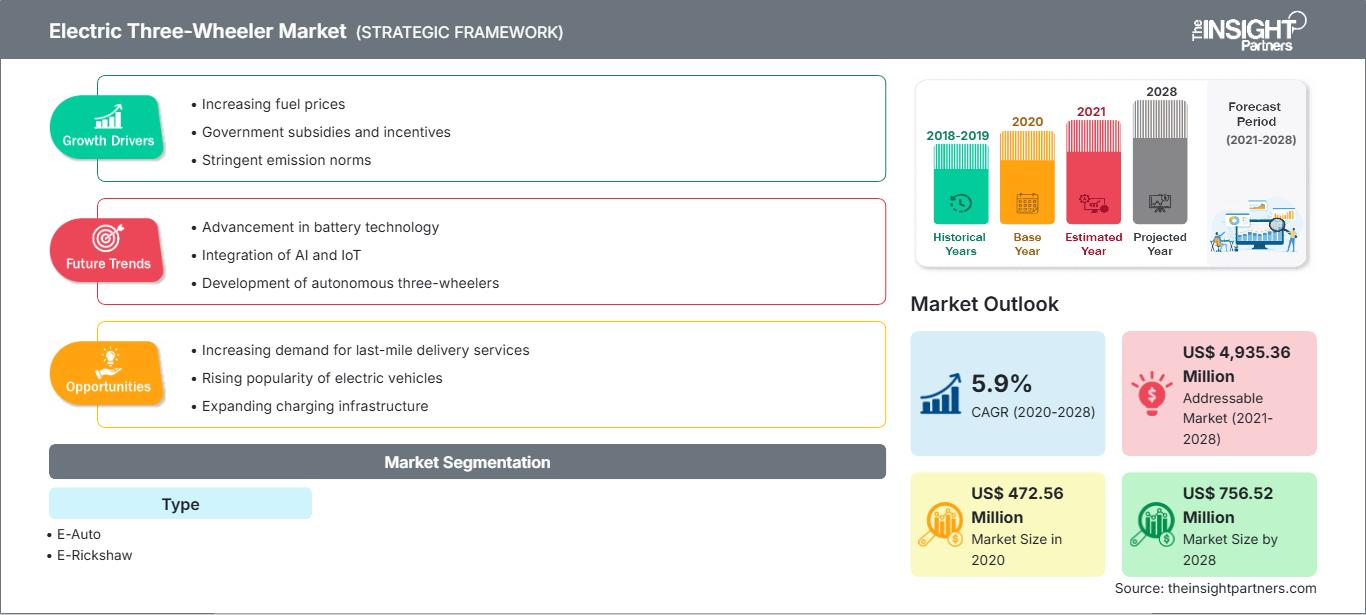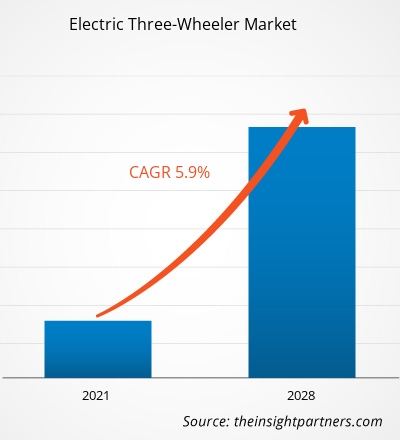전기 삼륜차 시장은 2020년 4억 7,256만 달러 규모였으며, 2028년에는 7억 5,652만 달러에 이를 것으로 예상됩니다. 2021년부터 2028년까지 연평균 성장률 5.9%로 성장할 것으로 예상됩니다.
전기 삼륜차는 승객을 목적지까지 운송하는 데 널리 사용되고 있으며, 상품 운송에도 널리 사용됩니다. 이 삼륜차는 충전식 배터리로 구동되는 전기 모터로 구동됩니다. 배터리는 전기 충전소나 기타 충전소에서 충전할 수 있습니다. 전 세계 저소득 및 중소득 국가에서는 초기에 내연기관(IC)으로 구동되는 삼륜차의 사용률이 높습니다. 그러나 이러한 내연기관 삼륜차는 대부분 비효율적이고 노후화되었습니다. 이로 인해 제조업체들은 전기 삼륜차 연구 개발에 대한 투자를 늘리고 있습니다. 더욱이 전기 삼륜차는 도시와 교외 지역에서 특히 단시간에 소수의 승객과 소형 화물을 운송하는 데 큰 인기를 얻고 있습니다. 전기 삼륜차 시장 성장을 견인하는 주요 요인으로는 엄격한 정부 규제, 디젤 및 가솔린 차량의 배출가스 유해성에 대한 인식 제고, 그리고 전기차에 대한 수용 증가 등이 있습니다. 휘발유와 경유는 고갈되는 자원이기 때문에 사람들은 이미 다른 대안을 모색하기 시작했습니다. 전기 삼륜차는 휘발유 및 경유 삼륜차를 대체하기 시작했습니다. 전기 삼륜차의 평균 유지 보수 및 운영 비용은 기존 삼륜차보다 상당히 낮습니다. 그러나 무거운 배터리 팩과 짧은 주행 거리는 전기 삼륜차 제조업체들이 직면한 몇 가지 우려 사항입니다. 전기 삼륜차는 배터리가 완전히 충전된 상태에서 약 125~130km를 주행할 수 있는 반면, 일반 차량은 연료 탱크를 가득 채운 상태에서 약 200~220km를 주행할 수 있습니다.
2020년 아시아 태평양 지역은 전기 삼륜차 시장을 장악했습니다. 인도는 이 지역 전기 삼륜차 시장의 최대 주주 중 하나입니다. 인도의 저배출 차량 산업은 정부의 우호적인 정책과 마힌드라 & 마힌드라, 아툴 오토, 피아지오, 로히아 오토와 같은 제조업체들의 탄탄한 입지를 바탕으로 빠르게 성장하고 있습니다. 14억 달러 규모의 예산이 편성된 하이브리드 및 전기 자동차의 신속한 도입 및 생산 II(FAME II) 계획은 전기차 구매 시 선불 할인 혜택에 11억 9천만 달러, 충전 인프라 구축 촉진에 190만 달러를 투자할 예정입니다. 이러한 조치는 수요 충족을 위해 50만 대의 전기 삼륜차에 적용될 것입니다.
요구 사항에 맞게 이 보고서를 사용자 정의하십시오.
이 보고서의 일부, 국가 수준 분석, Excel 데이터 팩을 포함하여 모든 보고서에 대한 사용자 정의를 무료로 받을 수 있을 뿐만 아니라 스타트업 및 대학을 위한 훌륭한 제안 및 할인을 이용할 수 있습니다
전기 삼륜차 시장: 전략적 통찰력

-
이 보고서의 주요 주요 시장 동향을 확인하세요.이 무료 샘플에는 시장 동향부터 추정 및 예측에 이르기까지 데이터 분석이 포함됩니다.
COVID-19 발생은 전기 삼륜차의 하드웨어 부품을 포함한 전자 장비의 공급망과 제조에 심각한 차질을 빚었습니다. 전 세계적으로 COVID-19 바이러스가 확산되고 봉쇄 조치가 시행됨에 따라 자동차 업계 전문가들은 전자 장비 공급망에서 최소 4분의 1의 차질이 발생할 것으로 예측했습니다. 각국 정부의 봉쇄 조치 해제가 경제 회복에 도움이 되면 전자 장비 및 자동차 산업은 곧 회복세를 보일 것으로 예상됩니다. 전자 장비 및 자동차 제품 생산은 2021년부터 증가할 것으로 예상되며, 이는 전기 삼륜차의 하드웨어 부품을 포함한 전자 장비 및 자동차 제조에 긍정적인 영향을 미칠 것으로 예상됩니다.
시장 분석: 유해 가스 배출량 증가, 비용 관리 및 청정 기술 수용
유해 가스 배출량 증가, 비용 관리 및 청정 기술 수용은 전기 삼륜차 시장 성장에 기여하는 주요 요인입니다. 전기 자동차 도입은 환경 오염 물질 배출을 크게 줄여 대기 질을 개선할 수 있습니다. 차량 연료 연소로 인한 온실가스 배출을 최소화하기 위해 전 세계 규제 기관은 친환경 차량 도입을 확대하기 위한 세제 혜택과 인센티브를 제공하고 있습니다. 거의 모든 주요 국가는 제조업체의 국내 전기 자동차 생산 확대를 유도하기 위해 보조금과 재정적 인센티브를 발표했습니다. 또한 세액 공제와 할인 혜택으로 많은 국내 사용자가 EV를 구매하고 있으며 2020년까지 도로에서 최소 60%의 친환경 차량이 운행될 가능성이 높아 연료 배출량을 줄이고 석유 제품에 대한 의존도를 낮출 수 있습니다.중국, 인도, 한국, 인도네시아, 방글라데시의 규제 기관은 전기 삼륜차 판매를 늘리기 위해 다양한 프로그램을 시행해 왔습니다.예를 들어, 2018년 3월 인도 중공업 및 공기업부는 총 13억 9천만 달러의 예산 지원을 받은 FAME 인도 계획의 2단계를 시작했습니다.이 단계는 보조금을 통해 50만 대의 전기 삼륜차, 55,000대의 전기 사륜차, 7,000대의 전기 버스, 10만 대의 전기 이륜차를 지원하는 것을 목표로 합니다.FAME 계획의 이 단계는 대중 사이에서 EV 채택을 촉진하기 위해 적절한 공공 충전 인프라를 구축하는 것을 목표로 합니다. 이를 통해 중공업·공기업부는 공공 부문 기업(PSE) 및 정부 기관을 포함한 다양한 이해관계자의 참여와 적극적인 참여를 기대합니다.
유형별 시장 분석
전기 삼륜차 시장은 유형별로 전기 자동차(고속)와 전기 인력거(저속)로 구분됩니다. 전기 인력거 부문은 2020년 시장을 주도했습니다. 전기 인력거는 출력이 낮은 전기 삼륜차로, 전기 자동차에 비해 배터리 용량이 낮습니다.
제품 개발 및 시장 주도 전략은 기업들이 제품 포트폴리오를 확장하기 위해 일반적으로 채택하는 전략입니다. Piaggio & C. SpA, Terra Motors Corporation, Kinetic Green Energy & Power Solutions Ltd., LOHIA AUTO INDUSTRIES, Mahindra Electric Mobility Limited는 고객 기반을 확대하고 글로벌 전기 삼륜차 시장에서 상당한 점유율을 확보하기 위한 전략을 실행하는 주요 업체로, 이를 통해 브랜드 인지도를 유지할 수 있습니다. 최근 주요 개발 동향은 다음과 같습니다.
- 2020년 10월, Mahindra Electric Mobility Ltd는 인도에서 새로운 전기 삼륜차 화물 모델인 Treo Zor를 출시한다고 발표했습니다. 검증된 Treo 플랫폼을 기반으로 하는 이 화물차는 픽업, 딜리버리 밴, 플랫베드의 세 가지 모델로 제공됩니다.
- 2018년 2월, Mahindra & Mahindra Ltd와 LG Chem은 첨단 리튬 이온 배터리 기술 분야에서 협력을 발표했습니다.
The Insight Partners의 분석가들은 예측 기간 동안 전기 삼륜차 시장에 영향을 미치는 지역별 동향과 요인들을 면밀히 분석했습니다. 이 섹션에서는 북미, 유럽, 아시아 태평양, 중동 및 아프리카, 그리고 중남미 지역의 전기 삼륜차 시장 부문 및 지역별 현황도 살펴봅니다.
전기 3륜차 시장 보고서 범위
| 보고서 속성 | 세부 |
|---|---|
| 시장 규모 2020 | US$ 472.56 Million |
| 시장규모별 2028 | US$ 756.52 Million |
| 글로벌 CAGR (2020 - 2028) | 5.9% |
| 이전 데이터 | 2018-2019 |
| 예측 기간 | 2021-2028 |
| 다루는 세그먼트 |
By 유형
|
| 포함된 지역 및 국가 |
북미
|
| 시장 선도 기업 및 주요 회사 프로필 |
|
전기 3륜차 시장 참여자 밀도: 비즈니스 역학에 미치는 영향 이해
전기 삼륜차 시장은 소비자 선호도 변화, 기술 발전, 그리고 제품 이점에 대한 인식 제고 등의 요인으로 최종 사용자 수요가 증가함에 따라 빠르게 성장하고 있습니다. 수요가 증가함에 따라 기업들은 제품 라인업을 확장하고, 소비자 니즈를 충족하기 위한 혁신을 추진하며, 새로운 트렌드를 적극 활용하고 있으며, 이는 시장 성장을 더욱 가속화하고 있습니다.

- 을 얻으세요 전기 삼륜차 시장 주요 주요 플레이어 개요
- E-Auto(고속)
- E-Rickshaw(저속)
회사 프로필
- Goenka Electric Motor Vehicles Private Limited
- Piaggio & C. SpA
- Terra Motors Corporation
- Kinetic Green Energy & Power Solutions Ltd.
- LOHIA AUTO INDUSTRIES
- Bodo Vehicle Group Co. Ltd.
- Nobe Cars
- Mahindra Electric Mobility Limited
- E-Tuk Factory BV
- JIANGSU KINGBON VEHICLE CO., LTD
- 과거 분석(2년), 기준 연도, CAGR을 포함한 예측(7년)
- PEST 및 SWOT 분석
- 시장 규모 가치/거래량 - 글로벌, 지역, 국가
- 산업 및 경쟁 환경
- Excel 데이터세트
최근 보고서
관련 보고서
사용 후기
구매 이유
- 정보에 기반한 의사 결정
- 시장 역학 이해
- 경쟁 분석
- 고객 인사이트
- 시장 예측
- 위험 완화
- 전략 기획
- 투자 타당성 분석
- 신흥 시장 파악
- 마케팅 전략 강화
- 운영 효율성 향상
- 규제 동향에 발맞춰 대응






















 무료 샘플 받기 - 전기 삼륜차 시장
무료 샘플 받기 - 전기 삼륜차 시장